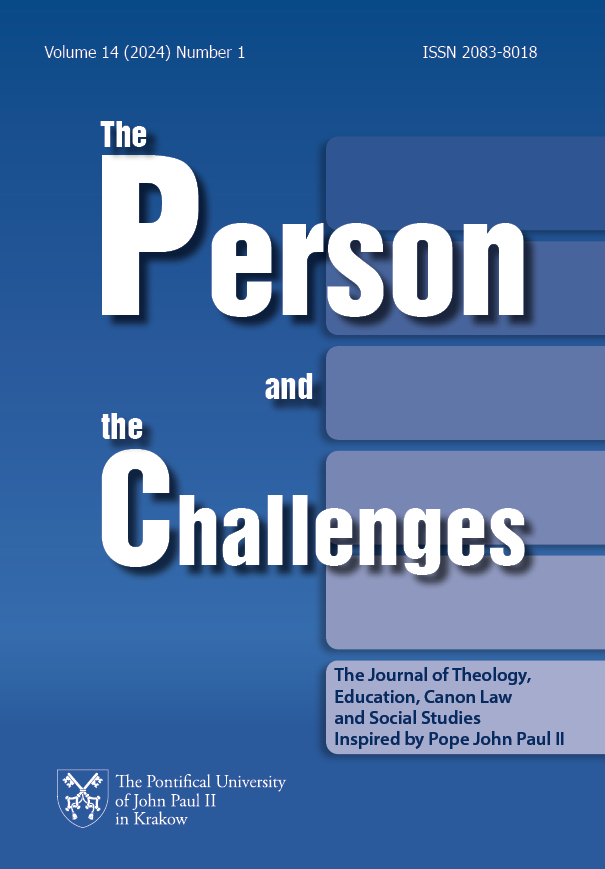Theologically Inspired and Supported Patriotism as a Component of Poland’s National Security. Concept of Research and its Social Application
DOI:
https://doi.org/10.15633/pch.14116Keywords:
patriotism, theology, national security, Poland’s cultural heritage, religiously inspired pro-societal behaviours, national responsibility, research projectAbstract
The article presents a concept of research and its social application concerning the creation and modelling of theologically inspired and supported patriotic attitudes in the Polish historical and security-related context. It concerns patriotism which, primarily, refers to Poland’s national heritage, theology, Catholic social science and national responsibility; secondly, it is directed at a sovereign economic development locally and on the international arena; thirdly, it shapes pro-societal and pro-defence attitudes; fourthly, it takes into account contemporary challenges linked with the environment, demography, migrations and “temporal challenges”. The text is classified among the papers on conceptualization of research projects in the area of security studies, social policies and political science, account being taken of the contexts and problem references to theology, history and cultural anthropology.
References
Babbie E., The Practice of Social Research, Boston 2020, Cengage Learning.
Bartnik Cz. S., Teologia narodu, Częstochowa 1999, Tygodnik Katolicki Niedziela.
Buczek J., Teologia narodu w ujęciu wybranych polskich teologów, Rzeszów 2014, Bonus Liber.
John Paul II, Memory and Identity: Conversations at the Dawn of a Millennium, New York 2005, Rizzoli.
Konferencja Episkopatu Polski, Chrześcijański kształt patriotyzmu, Warszawa–Tarnów 2017, Wydawnictwo Diecezji Tarnowskiej Biblos.
Konferencja Episkopatu Polski, Dyrektorium Duszpasterstwa Rodzin, Warszawa 2003, Fundacja Vita Familiae.
Konferencja Episkopatu Polski, O chrześcijańskim patriotyzmie, in: Listy pasterskie Episkopatu Polski 1945–2000, P. Libera, A. Rybicki, S. Łącki (eds.), Part 1, Marki 2003, Michalineum, pp. 886–891.
Konferencja Episkopatu Polski, W trosce o człowieka i dobro wspólne, Warszawa–Tarnów 2012, Wydawnictwo Diecezji Tarnowskiej Biblos.
Koseła K., Polak i katolik. Splątana tożsamość, Warszawa 2003, Wydawnictwo Instytutu Filozofii i Socjologii PAN.
Lewandowski J., Naród w dziejach Zbawienia, Warszawa 2001, Wydawnictwo Uniwersytetu Kardynała Stefana Wyszyńskiego, “Adam” Oficyna Wydawniczo-Poligraficzna i Reklamowo-Handlowa.
Lewandowski J., Naród w nauczaniu kardynała Stefana Wyszyńskiego, Warszawa 1982, Ośrodek Dokumentacji i Studiów Społecznych.
Marczak J., Jakubczak R., Skrabacz A., Gąsiorek K., Przeworski K., Doświadczenia organizacji bezpieczeństwa narodowego Polski od X do XX wieku. Wnioski dla Polski w XXI wieku, Warszawa 2013, Akademia Obrony Narodowej.
Memoriał Episkopatu Polski do Rządu PRL w sprawach istotnych kultury chrześcijańskiej w Polsce z dnia 24. I. 1974 r., typescript, Archives of the Conference of the Polish Episcopate, Warszawa.
National Security Strategy of the Republic of Poland, Warszawa 2020.
Pilch T., Bauman T., Zasady badań pedagogicznych: Strategie ilościowe i jakościowe, Warszawa 2010, Wydawnictwo Akademickie “Żak”.
Scholte J.A., Globalization: A Critical Introduction, Basingstoke 2005, Palgrave Macmillan.
Smuniewski C., Ku identyfikacji współczesnej drogi miłośnika ojczyzny. Z badań nad tożsamością i patriotyzmem w tworzeniu bezpieczeństwa narodowego Polski, in: Powrót do Ojczyzny? Patriotyzm wobec nowych czasów. Kontynuacje i poszukiwania, C. Smuniewski, P. Sporek (eds.), 2nd revised and expanded edition, Warszawa 2021, Oficyna Wydawnicza ASPRA-JR, Wydawnictwo Instytutu Nauki o Polityce, pp. 19–50.
Smuniewski C., Na drogach krzewienia miłości Ojczyzny. Patriotyzm jako fundament bezpieczeństwa narodowego, in: Klasy mundurowe. Od teorii do dobrych praktyk, A. Skrabacz, I. Urych, L. Kanarski (eds.), Warszawa 2016, Wydawnictwo AON, pp. 39–51.
Smuniewski C., Wychowanie do patriotyzmu. Studium o miłości ojczyzny w oparciu o biblijną i współczesną myśl katolicką, in: Bezpieczeństwo jako problem edukacyjny, A. Pieczywok, K. Loranty (eds.), Warszawa 2015, Wydawnictwo AON, pp. 84–103.
Społeczeństwo teologiczne. Polska teologia narodu 966–2016, P. Rojek (ed.), Kraków 2016, Wydawnictwo M.
Urych I., Potencjał obronny klas wojskowych. Teoretyczno-empiryczne aspekty kształcenia obronnego, Warszawa 2019, Wydawnictwo Akademii Sztuki Wojennej.
Downloads
Published
Issue
Section
License

This work is licensed under a Creative Commons Attribution 4.0 International License.
Authors who publish with this journal agree to the following terms:
- Authors retain the copyright and full publishing rights without restrictions, and grant the journal right of first publication with the work simultaneously licensed under a Creative Commons Attribution 4.0 International License that allows others to share the work with an acknowledgement of the work's authorship and initial publication in this journal.
- Authors are able to enter into separate, additional contractual arrangements for the non-exclusive distribution of the journal's published version of the work (e.g., post it to an institutional repository or publish it in a book), with an acknowledgement of its initial publication in this journal.
- Authors are permitted and encouraged to post their work online (e.g., in institutional repositories or on their website) prior to and during the submission process, as it can lead to productive exchanges, as well as earlier and greater citation of published work (See The Effect of Open Access).

